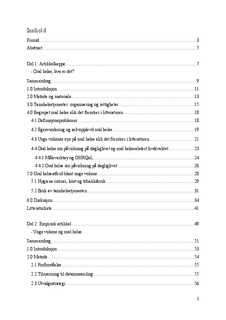| dc.description.abstract | The theme of this master’s thesis occurred out of my experiences with different views on oral health both through my job as a dental hygienist and situations in everyday life. In Norway there are free dental services for everyone until the year you turn 19. And I was curious about how young adults (+/- 18-30 years of age) look at oral health, is the mouth considered as more than just teeth?
As a background for the empirical article the first part of the master’s thesis looks at existing research. A search of literature was conducted to explore the research question: “What is oral health?” and mainly articles on young adults in industrialized countries and oral health were included.
How one considers oral health and oral health related behaviour will always be complex and depend on surrounding factors as well as the individual. Also commercial actors and the dental services will have an influence. The Norwegian dental health-services are founded on the thought of everyone having the same access to service, but at the same time there are socioeconomic differences both in oral health and oral health related behaviour.
According to the existing research it looks like young adulthood, and the time around when
dental services no longer are free of charge, represents a cross roads both associated with the change in rights but also a potential difference considering future oral health. Because of these findings this time in life becomes of extra interest.
The research on young adults’ oral health and how they themselves consider this seems to be limited and I have not been able to find any qualitative interviews with young adults in Norway. To better understand what happens after the change in rights within dental services more knowledge is needed. This will also be important in evaluating dental services and might raise the chances for the development of services to be in a positive direction. The aim of the empirical part of this master’s thesis was therefore to contribute to this knowledge by taking a closer look at young adults’ thoughts, meanings and experiences on oral Health outside a clinical setting.
For the empirical part eight semi structured interviews with students and apprentices in
Trondheim were conducted. The main focus was the meaning of the term oral health itself,
but also what this means in the daily lives of the informants and their future aspects of it. The use of dental services was also discussed. The data was analysed based on systematic text condensation, a method inspired by Giorgis’ descriptive phenomenological analysis and modified by Malterud. The main discoveries were put into three categories: “oral health and daily life”, “oral health as influenceable” and “the mouth as a sacred and private area”.
Oral health was first and for most seen as having to do with dental health, oral hygiene
routines and self-presentation, at the same time possibilities to influence oral health were
recognised. This supports earlier findings and recommendations of including more than
DMFT as a clinical indicator as well as self-evaluations and factors related to psychological influences on everyday life when looking at young adults and their oral health.
At the same time the informants descriptions were an eye-opener and triggered ideas of taking a closer look at the way the services are organised and how these young adults are prepared for being left on their own the year they turn 19. | nb_NO |
